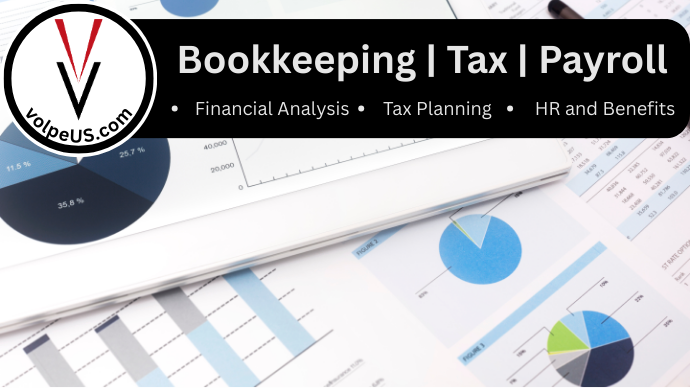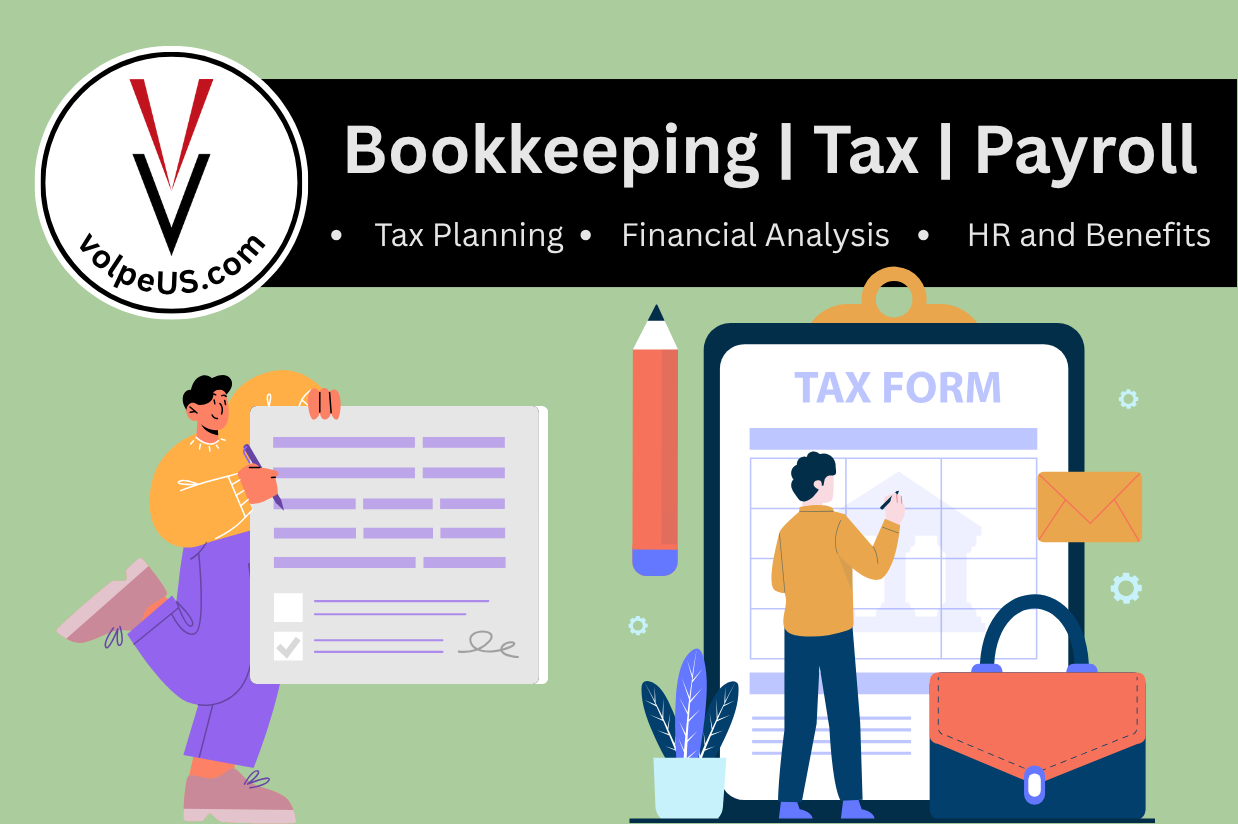Executive summary:
Operating a business necessitates understanding, at some level, certain financial concepts. Functions such as payroll bookkeeping, and the generalized area of accounting are all closely related in this regard, while each also have a great deal of detail contained within each. Having an understanding of the aspects of each can lead to a more complete understanding of the financial side of business, outside of everything else needed to keep the lights on. This article goes into detail on these three topics, explaining the difference and function of each:
Payroll: Managing employee compensation, taxes, and benefits.
Bookkeeping: Recording and organizing daily financial transactions.
Accounting: Analyzing financial data, preparing reports, and ensuring tax compliance.
Key Differences: Understanding how each function supports business operations at different stages of financial management.
Understanding the Differences Between Accounting, Payroll, and Bookkeeping
In the world of business finance, the terms accounting, payroll, and bookkeeping are often used interchangeably by individuals unfamiliar with their specific definitions and roles. While these three concepts are all integral components of managing a business’s financial operations, they serve distinct functions. Understanding the differences between them can help business owners make more informed decisions regarding which services they require and, equally importantly, whom to hire to manage them effectively.
This article provides a detailed overview of the core distinctions between accounting, payroll, and bookkeeping, elaborating on the responsibilities and significance of each function. By exploring each of these areas, businesses can better grasp how they contribute to overall financial health and ensure they are making strategic choices in managing their finances.

Jump to a Specific Section
The Role of Payroll in Business Operations
At its most basic level, payroll refers to the list of employees working for a company, but in a broader sense, it encompasses several key tasks and processes related to compensating employees. Payroll involves calculating, managing, and distributing employee wages, salaries, bonuses, and commissions on a regular basis, typically bi-weekly or monthly, depending on the company’s structure. While payroll may seem straightforward, it involves a wide range of tasks that need to be handled with accuracy and compliance to ensure legal and financial obligations are met.
Key Components of Payroll
Payroll management includes several core responsibilities:
- Employee Compensation: This refers to the direct financial compensation paid to employees, including base salaries, hourly wages, bonuses, and overtime pay.
- Deductions and Withholdings: Employers are required to withhold taxes such as federal and state income tax, Social Security contributions, and Medicare taxes. Additionally, other deductions may include retirement contributions, insurance premiums, or wage garnishments.
- Tax Compliance: Payroll is intricately linked to tax laws and regulations. Ensuring that the correct amounts are withheld and remitted to appropriate tax agencies is crucial for avoiding penalties.
- Employee Benefits: Payroll may also involve calculating and administering fringe benefits such as paid time off (PTO), health benefits, and retirement plan contributions.
Managing payroll is more than just issuing paychecks. It requires maintaining accurate records of each employee’s compensation, taxes, and benefits. Furthermore, businesses must stay updated on constantly changing tax laws and regulations, ensuring that all aspects of payroll management remain compliant.
Methods of Managing Payroll
There are multiple ways to handle payroll, each of which has its advantages and drawbacks:
- In-house Payroll: This method involves manually processing payroll within the company. While it can offer a higher degree of control, it is also time-consuming and requires the person handling it to stay informed on tax laws and accounting practices. Often, this task is managed by a bookkeeper or HR personnel trained in payroll procedures.
- Payroll Software: Software solutions like QuickBooks, Gusto, and ADP are designed to automate many aspects of payroll management, including tax calculation, paycheck distribution, and tax filing. Payroll software can save businesses time, reduce errors, and ensure compliance with tax laws.
- Outsourcing Payroll: Some companies choose to outsource their payroll to professional payroll service providers. This option removes the burden of payroll processing from internal staff and allows experts to manage the entire payroll cycle, ensuring accuracy and timeliness.
In summary, payroll is critical to maintaining employee satisfaction, legal compliance, and the overall financial health of the business. Outsourcing or leveraging software solutions for payroll management can be a smart move for businesses looking to streamline this complex function.

Bookkeeping: The Foundation of Financial Record-Keeping
Bookkeeping refers to the process of recording, storing, and organizing all financial transactions of a business, nonprofit, or individual. The role of bookkeeping is often confused with that of accounting, but it is important to note that bookkeeping is primarily focused on the daily tracking of transactions, while accounting involves a broader scope, including interpretation, analysis, and reporting of financial data.
Core Responsibilities of Bookkeeping
Bookkeeping encompasses a variety of tasks related to the organization and documentation of financial transactions:
- Tracking Receipts and Invoices: Bookkeepers maintain records of all payments made by customers and those owed to suppliers. This includes sales invoices, purchase invoices, receipts, and proof of payments.
- Managing Accounts Receivable and Payable: One of the key functions of bookkeeping is ensuring that payments owed to the business (accounts receivable) and payments that the business needs to make (accounts payable) are tracked and processed efficiently.
- Payroll Processing: Bookkeepers often assist with payroll, ensuring that employees are paid accurately and on time. They may calculate wages, process deductions, and maintain payroll records.
- Financial Reporting: Bookkeepers generate financial reports to provide insight into the company’s cash flow and overall financial health. This can include profit and loss statements, balance sheets, and other relevant financial reports.
The Role of Bookkeeping Software
In today’s digital age, bookkeeping is most commonly carried out through the use of accounting software. Programs like QuickBooks, Xero, and FreshBooks allow bookkeepers to record transactions efficiently, categorize expenses, and generate financial reports with ease. The use of automated bookkeeping software improves accuracy, reduces errors, and provides valuable financial data in real time.
Though bookkeepers manage the transactional side of financial operations, they do not engage in the higher-level analysis and interpretation of financial data. That role belongs to accountants, who take the records provided by bookkeepers and transform them into meaningful financial insights.

Accounting: The Comprehensive Oversight of Financial Health
While bookkeeping deals with the collection and recording of financial data, accounting is the process of analyzing, interpreting, and reporting that data to give a clear picture of a company’s financial status. Accounting involves a more comprehensive approach, as it aims to present financial data in an accessible and standardized format for both internal and external stakeholders, such as managers, investors, regulators, and tax authorities.
Key Functions of Accounting
Accounting is a multifaceted field with three primary areas of focus:
- Financial Accounting: This branch of accounting focuses on preparing financial statements in accordance with generally accepted accounting principles (GAAP) or International Financial Reporting Standards (IFRS). These statements, such as balance sheets, income statements, and cash flow statements, provide an overview of a company’s financial position.
- Management Accounting: While financial accounting is intended for external stakeholders, management accounting is used internally by business owners and managers to make decisions related to budgeting, cost management, and strategic planning. This form of accounting helps management evaluate operational efficiency and plan for future growth.
- Tax Accounting: Tax accounting ensures that a business complies with all federal, state, and local tax regulations. Accountants specializing in tax accounting help businesses prepare tax returns, calculate liabilities, and minimize tax exposure through strategic planning.
The Importance of Accounting
Accounting is an essential function for any business, as it allows stakeholders to make informed decisions based on accurate financial data. Without proper accounting practices, businesses would lack a clear understanding of their financial health, making it difficult to plan for growth, invest in new opportunities, or even maintain profitability.
Furthermore, accounting plays a pivotal role in ensuring compliance with various financial regulations and tax laws. Businesses must maintain accurate accounting records to avoid penalties and legal issues. Moreover, sound accounting practices provide businesses with the necessary tools to secure funding, attract investors, and manage cash flow effectively.

Conclusion: How Payroll, Bookkeeping, and Accounting Work Together
Payroll, bookkeeping, and accounting, while distinct in their roles, all contribute to the financial integrity of a business. Payroll ensures employees are compensated accurately and on time, bookkeeping records and organizes financial transactions, and accounting interprets this data to present a comprehensive view of the business’s financial standing.
It is crucial for businesses to understand the specific needs of each function to determine whether they need to outsource these services or handle them in-house. Small businesses may choose to combine bookkeeping and payroll into one role, while larger enterprises may prefer to have separate specialists for each function. Regardless of the structure, however, these functions must work in harmony to ensure a smooth and efficient financial operation.
In today’s fast-paced and ever-evolving business environment, leveraging technology through accounting software and payroll solutions can significantly enhance efficiency and reduce the risk of errors. Outsourcing these services to professional firms can also save valuable time and resources, allowing business owners to focus on their core operations and strategic growth.
By clearly understanding the distinctions between payroll, bookkeeping, and accounting, business owners can make informed decisions that contribute to long-term financial success.
If there’s a pain point within your operation that you’d like to discuss, we’re here. We’d appreciate the opportunity to look into it with you and hopefully provide some insight as to how you can move forward. For more information, or to just put a few faces to the name,
Disclaimer: The content on this blog is for informational, educational, and occasional entertainment purposes only. It should not be construed as legal, tax, or financial advice.














